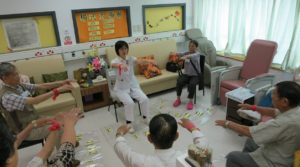(Hong Kong, 23 May 2012)The Palliative Centre of North District Hospital was officially opened on 22nd May 2012. The centre provides hospice and palliative service for terminal cancer patients in a comfortable environment where patients can complete their life journey with dignity. This centre is the ninth centre established under the Hong Kong Hospice Service Program, ‘Heart of Gold’ which is a collaboration between the Hospital Authority and the Li Ka Shing Foundation. To enable the community to understand the merits of hospice and palliative care, the centre conducted a ‘Palliative Service in the Community Symposium’ on the opening day.
Home Feel
Terminal cancer patients are vulnerable. As their organ functions deteriorate, they need special attention. Hospice and palliative service effectively alleviates pain and discomfort and enhances their quality of life. The centre is designed like a ‘home’, giving patients the feeling of being in the comfort of their own home for treatment. They could lie on the massage coach to receive treatment, while expressing their feelings and communicating their comfort levels. Furthermore, healthcare providers would prescribe medication such as analgesics to control pain and to tailor-make treatment plans for patients to sooth their discomforts. For example, physiotherapists could teach patients to perform simplified Tai Chi to improve muscle strength and to ease muscle aches.
Spiritual Guidance
Spiritual care is essential for terminal cancer patients. Some patients might have unfulfilled wishes which might be regarded as trivial by someone, like making a call to their relative living aboard. The wish may have special meaning but was somehow unfilled for unknown reasons. The patients may need some counseling and guidance to open up about their wishes and concerns. The centre collaborates with various organizations like non-government organizations and spiritual centres to provide such spiritual care.
Community Force
The community is a vast resource for providing physical, spiritual, social and psychological support for terminal cancer patients. Professor Li Kam-tao, Deputizing Cluster Chief Executive, NTEC said that family members of patients are vulnerable and need support to go through the grief process. Fortunately, once they have navigated the stages of grief, they are empowered and better prepared to help others in similar situations. Many volunteers in the centre have had similar experiences before. They understand that a telephone call, a consolatory note or simply a cup of tea to the patients and relatives can give patients warmth and strength.
To make use of this resource, the centres invited members of the community to join the symposium on “Palliative Service in the Community” to introduce the scope of palliative and hospice services. An expert on human behavior from Hong Kong University was invited to share his expertise on how to handle emotional reactions in such situations. The audience was touched by the sharing and many of them said they would like to be volunteers to serve terminal cancer patients and their families and help them through this difficult stage.

